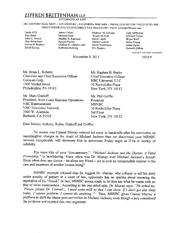Executors for the estate of Michael Jackson demanded Wednesday that MSNBC drop its plan to air a "reprehensible" documentary that promises a behind-the-scenes glimpse of the singer's relationship with Dr. Conrad Murray, but which they charged smears the late pop icon.
In a letter to MSNBC President Phil Griffin and the cable channel's corporate overseers, the Jackson representatives argued that Murray, convicted Monday of involuntary manslaughter in Jackson's death, uses the documentary "to shift the blame post-conviction to Michael Jackson, even though a jury considered the evidence and rejected this very argument."
MSNBC purchased "Michael Jackson and the Doctor: A Fatal Friendship" from a British production company and plans to air it Friday and Monday night, along with an "exclusive" interview with Murray by NBC News correspondent Savannah Guthrie.
DOCUMENTS: Read the Jackson estate letter to MSNBC
A Los Angeles Superior Court jury convicted Murray for administering propofol, a surgical anesthetic, to Jackson and then failing to monitor the pop star as he stopped breathing.
MSNBC representatives had said earlier that the cable channel did not pay for access to Murray or contribute to his legal defense.
The producer of the documentary, October Films, said it paid only $1 for two years of access to Murray and a behind-the-scenes look at his legal defense.
Representatives of MSNBC and October Films said they did not know what arrangements might have been made by the film's distributor, Zodiak Rights. Zodiak representatives could not be reached.
The Jackson family representatives questioned whether additional payments were made to Murray.
"Was it really only $1, or was it more?" said a letter from John Branca and John McClain, who are co-executors of the Michael Jackson estate.
MSNBC did not immediately respond to the demand to cancel the airing of the documentary. http://latimesblogs.latimes.com/lanow/2011/11/michael-jackson-conrad-murray-msnbc-documentary-.html



A Los Angeles Superior Court jury convicted Murray for administering propofol, a surgical anesthetic, to Jackson and then failing to monitor the pop star as he stopped breathing